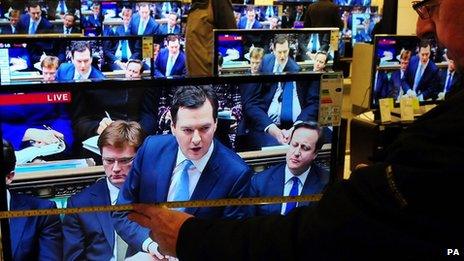Budget 2013: Stagnation Nation
- Published

It may take some time to measure the impact of the Chancellor's plans
Well, at least business is pleased.
It may not like the top line figures showing there's hardly any momentum in the economy. But comment off the back of George Osborne's fourth Budget showed they liked a plethora of measures, as the Chancellor shuffled around his very limited options.
Taking corporation tax down to 20%, a tax break on the first £2000 of employers' national insurance contribution, higher R&D credits, some big measures to kick-start the housing market; business reckons it can make use of them.
In Edinburgh and London, asset managers like the look of the £145m per year cut in the special tax they have to pay on transactions, helping them compete internationally.
There are, of course, those who felt opportunities had been missed; to lower Air Passenger Duty, or to reform business rates as a help to retail.
Drink problem
There seemed a lot more to offer business than there was to help squeezed household budgets.
The main help was rising threshold for paying income tax, heading towards £10,000 next year (though bigger earners watch out for the starting point of higher rate tax coming down to neutralise the effect).
Freezing fuel duty this autumn will be politically popular, if not with the environmental lobby, but there was nothing in this Budget to tackle energy utility bills, which represent a much bigger problem for most households.
And yes, one pence off a pint of beer is good for a headline, but you've got to have a serious drink problem before that has much impact on your personal finances.
This was, as the Treasury must have known, an invitation to whisky distillers and wine merchants to complain of discrimination. As whisky exports grow, dependence on the UK market is falling anyway, so UK duty matters less and less.
But it's worth noting this is a mildly perverse resolution to the reported divisions within the Cabinet over minimum unit pricing for England.
Using the tax system would be a much smarter way of cutting consumption, for social or health reasons, and to help balance those books.
The power of energy
In Scotland, the distinctive elements of the 2013 budget were mainly around energy. No surprise there. It's increasingly clear that hydrocarbons and, to a lesser extent, renewables are the dynamic bits of the economy.
After George Osborne's ill-fated £2bn raid on offshore oil and gas two years ago, he's still repairing the damage to relations. This year, he confirmed he will clarify the tax breaks that will be applied to decommissioning of offshore kit.
That is intended to unlock billions in investment. Indeed, the expectation of this deal has already helped bring new money, a lot of it Chinese, into the UK's offshore assets.
There's a fight to be had over the capital funds allocated to Holyrood, as most of that is for lending, and on condition that it's repaid.
South of the border, it's being used to stimulate the housing market with more than £3bn in shared equity - a proposition that has been welcomed by house-builders, but which others (including some on the Right) fear could simply inflate prices and leave the Government exposed to the bursting of another asset bubble.
If Scottish ministers choose, Whitehall says the money (£266m over two years) could be used for other assets from which the Treasury could be repaid, such as funding the more marginal renewable energy projects. But it's a significant change to the convention that block grants come without strings attached.
Oil tax fall
The other cross-border row which could have been expected to emerge from the Budget documents is over oil revenues.
And sure enough, the pro-union side highlighted the sharp drop forecast in offshore revenues this year. The Office of Budget Responsibility (OBR) had foreseen it falling from £11.2bn for 2011-12 to £7.3bn in 2012-13.
There's no sign of the OBR rethinking its reckoning in light of the Scottish government's substantially more optimistic assumptions leading to higher revenue forecasts. On the contrary, it's revised down its UK oil and gas revenue forecast for this year by £800m, to reach £6.5bn.
While it hasn't much changed for subsequent years, that's a figure being used to underscore the argument about the volatility of oil production and prices, and how much that could put the finances of an independent Scotland at the mercy of markets and drillers.
Referendum resonance
With the attachment of new strings to Holyrood's budget, and the combustible question of how much Scotland could depend on oil revenues, this Budget will resonate all the way to the referendum date.
What will probably resonate much louder is the bit that was barely mentioned in George Osborne's budget statement - the spending cuts that not only continue, but deepen slightly. Holyrood will have £103m less to spend on funding services over the next two years, as a consequence of the 2013 Budget. Whitehall departments reaching north of the border, primarily with welfare, will squeeze budgets harder, while public sector employment falls.
But as that stagnating growth is being blamed on exports, and in turn on the weak eurozone, the Budget day story that could resonate louder still was being played out in Nicosia, Moscow and Berlin.
This was a fiscally neutral Budget for Britain, but it's the renewed high-stakes show-down between Cypriot democracy and Europe's central financial institutions that could have more impact on economic recovery than anything Mr Osborne had to say.